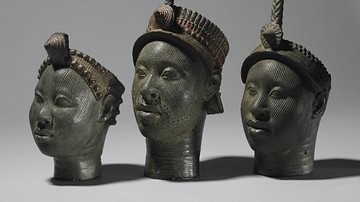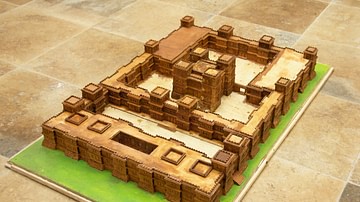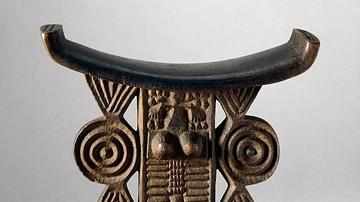Search Definitions
Browse Content (p. 157)

Definition
Nok Culture
The Nok culture, named after the settlement of the same name, flourished in southern West Africa (modern Nigeria) during the Iron Age from the 5th century BCE to the 2nd century CE. Famous for the distinctive terracotta sculptures of human...

Definition
Christine de Pizan
Christine de Pizan (also given as Christine de Pisan, l. 1364 - c. 1430) was the first female professional writer of the Middle Ages and the first woman of letters in France. Her best-known works advocated for greater equality and respect...

Definition
Ife
Ife (aka Ile-Ife) was an ancient African city which flourished between the 11th and 15th century CE in what is today Nigeria in West Africa. Ife was the capital and principal religious centre of the Yoruba kingdom of Ife, which prospered...

Definition
Charlemagne
Charlemagne (Charles the Great, also known as Charles I, l. 742-814) was King of the Franks (r. 768-814), King of the Franks and Lombards (r. 774-814), and Holy Roman Emperor (r. 800-814). He is among the best-known and most influential figures...

Definition
Kingdom of Axum
The African kingdom of Axum (also Aksum) was located on the northern edge of the highland zone of the Red Sea coast, just above the horn of Africa. It was founded in the 1st century CE, flourished from the 3rd to 6th century CE, and then...

Definition
Medieval Literature
Medieval literature is defined broadly as any work written in Latin or the vernacular between c. 476-1500, including philosophy, religious treatises, legal texts, as well as works of the imagination. More narrowly, however, the term applies...

Definition
Mutapa
Mutapa (aka Matapa, Mwenemutapa, and Monomotapa) was a southern African kingdom located in the north of modern Zimbabwe along the Zambezi River which flourished between the mid-15th and mid-17th century CE. Although sometimes described as...

Definition
Uluru
Uluru (also known as Ayers Rock and pronounced: ool-or-roo) is a large natural sandstone rock formation located in the Northern Territory of Australia. It stands at a massive 348 meters tall and measures a lengthy 9.4 km in width. The sandstone...

Definition
Mapungubwe - The Great Iron Age Kingdom of Southern Africa
Mapungubwe, located in the very north of South Africa just below the Limpopo River, was an Iron Age settlement and kingdom which flourished between the 11th and 13th century CE. It was perhaps southern Africa's first state. Mapungubwe, whose...

Definition
Great Zimbabwe
Great Zimbabwe is a ruined city near Masvingo, central Zimbabwe which was inhabited between c. 1100 to c. 1550 (flourishing c. 1300 - c. 1450) in the region’s Late Iron Age. Capital of the Kingdom of Zimbabwe of the Bantu-speaking Shona people...